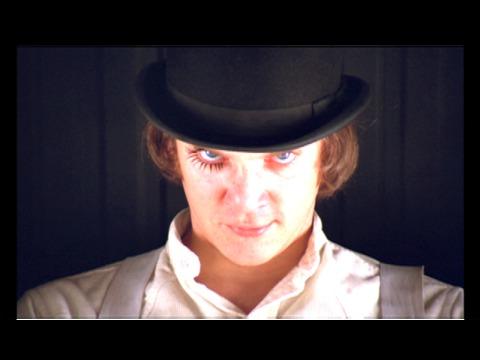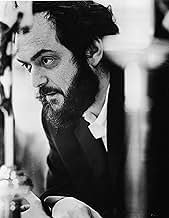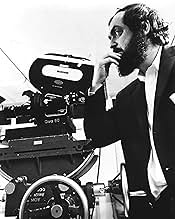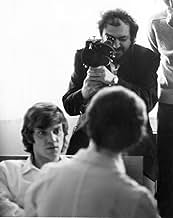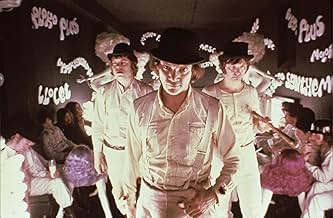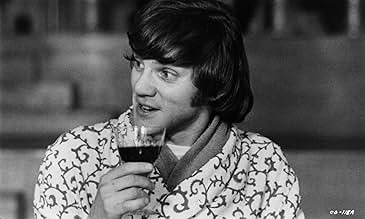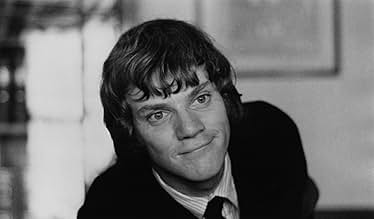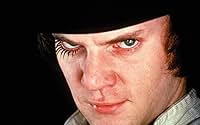Im Großbritannien der Zukunft sitzt der charismatische Delinquent Alex DeLarge im Gefängnis. Er meldet sich freiwillig für eine experimentelle Aversionstherapie, die von der Regierung zur Lö... Alles lesenIm Großbritannien der Zukunft sitzt der charismatische Delinquent Alex DeLarge im Gefängnis. Er meldet sich freiwillig für eine experimentelle Aversionstherapie, die von der Regierung zur Lösung des Kriminalitätsproblems entwickelt wurde - aber es läuft nicht alles nach Plan.Im Großbritannien der Zukunft sitzt der charismatische Delinquent Alex DeLarge im Gefängnis. Er meldet sich freiwillig für eine experimentelle Aversionstherapie, die von der Regierung zur Lösung des Kriminalitätsproblems entwickelt wurde - aber es läuft nicht alles nach Plan.
- Regie
- Drehbuch
- Hauptbesetzung
- Für 4 Oscars nominiert
- 12 Gewinne & 26 Nominierungen insgesamt
Zusammenfassung
Empfohlene Bewertungen
While the film's depictions of violence and sex are what it's most known for, ACO works on far deeper levels. The disturbing portrayal of youth and its satirical depiction of a government's attempts to create a better society are brilliant, but the most fascinating aspect of ACO is the questions it poses about good and evil. While the crimes Alex commits at the beginning of the film are atrocious, what the government does to him is worse. The film presents the absolute worst aspects of man, but shows that even these are still favorable to a man without the choice. People can denounce the film because of its brutal content, but the importance of the questions it poses can't be denied.
Equally excellent to the film's content is the effort by the crew. Kubrick's perfectionism pays off well, as ACO in one of his most visually striking films. Malcolm MacDowell is nothing short of amazing as Alex. Kubrick's use of surreal imagery and set pieces, as well as the ingenious use of music to compliment the on-screen action, creates a world that perfectly reflects the protagonist's behavior and the government's policies.
A Clockwork Orange is by no means an easy film to get through, as many will be turned off by the scenes of violence and rape. But this masterpiece is far more complex than a simple romp through a world of youthful violence. It's a rare example of film-making that demands that the viewer actually think. Real horrorshow all around, Oh my brothers.
The director wants the audience to feel something as bad not because he is showing it as bad but because it really is bad. The background music accompanying the ultra violent scenes is comical, and not dramatic or anything else that is commonly associated with such scenes. This gives the viewer an opportunity to feel the bitterness not because the music hints so but because he himself feels so. Viewer's emotions should arise irrespective of what the director is trying to show, and this is one of the greatest successes of the movie.
Another glorifying feature is the central idea of the movie. If a human is striped of the choice to choose from good and evil, he no longer remains a human, he becomes a clockwork. When Alex is brain-washed and "programmed" to choose only good, he wasn't accepted by the society and this shows the irony in the objectives of the British Government. The word Orange from the title presumably comes from the word "Ourange" that loosely means man. And hence the title is so appropriate to the movie.
The artificiality in dialogues and sets give the movie a unique feature and enhance the grip on it. This also means that the viewer has to get more involved. This is definitely one of the best technically shot movies, another masterpiece of Kubrick like the Space Oddessey.
For the uninitiated, set in near future Britain, the movie shows Malcom MacDowell as the head of a group of youngsters involved in sexual violence. Turn of the events leave the protagonist in the hands of the police. Worried by the growing number of prisoners the British Government devises a method of "programming" them so that they always choose the good. Alex is chosen as one of those on which the new system is to be tested. The rest unfolds as a saga of the very human characteristic.
Lastly, I would like to say that you may be compelled to leave the movie in between, but if you are watching it for art and cinematic experience, I recommend you to sit through.
This is almost experimental in its examination of sex and violence in society. It is an unique surreal film. The ideas behind it may be lost to people who sees this simply as an artistic violent movie. No matter how one dissects this, Malcolm McDowell's performance is beyond reproach. He shows his great acting abilities.
The film became infamous for its depiction of violence and sex. It overlooked the fact that despite its initial scenes of brutality and rape, in its heart it is a dark comedy set in a futuristic Dystopian Britain.
An adaptation of Anthony Burgess novel, Malcolm McDowell might be a shade too old to play the teenage delinquent Alex getting high on milk-plus which is infused with drugs and then partakes in an orgy of ultra-violence which includes beating up a vagrant, fighting with a rival gang and then speeding through the country roads where they burst into the house of a writer who gets beaten up and watches his wife get raped as Alex sings Singin in the rain.
We know Alex is still at school as he lives in his parents flat and is visited the next morning by his probation officer who is concerned about his absence from school.
However Alex's luck runs out. He falls out with his fellow gang members and when he breaks into another house, he kills a woman with a phallic sculpture, betrayed by his gang and caught by the police, he is sentenced to 14 years in jail.
The opening part of the film would had been deemed shocking in early 1970s Britain. I doubt that level of sex and savagery would had ever been seen before in a mainstream British film.
However the film becomes more of a surreal prison film once Alex ends up in jail where he joins a church group and tries to fend off advances from fellow inmates. A visiting government minister offers him a chance to take part in an experiment. Once he undertakes an experimental aversion therapy for rehabilitating criminals within two weeks the film becomes a black revenge comedy.
Once freed from prison and rehabilitated Alex finds there is no room for him in his parents home, he gets set upon by a gang of vagrants as the tramp who he beat up in the beginning recognises Alex. His old gang members are now in the police and they torture him. Worse still he stumbles into the house of the writer who he attacked and he gets his vengeance as well. Poor Alex now cannot listen to his favourite piece of Beethoven without doing harm to himself.
There is an underlying political satire of a government wanting to tackle violence in society by being draconian themselves until public opinion turns against them.
The film contains a lot of slang derived from east European languages and although I mentioned he looked rather old to play the teenage Alex, Malcolm McDowell delivers an amazing performance providing a narrative with his Yorkshire tones.
The film might put off some of its audience with its disturbing opening but settles in well after that.
**** (out of 4)
Set at some point in the future, British teen Alex DeLarge (Malcolm McDowell) spends most of his time hanging with his goon friends, raping women and causing other violent harm but after he's caught he volunteers for an experimental therapy that doesn't quite work as planned. Sick, shocking, crude, violent, nauseating and vulgar are just a few of the words that many will use when describing this film but I'd call it a true piece of art that rightfully deserves its high reputation. Many people have said that a Kubrick film would never be a Kubrick film if it wasn't an ego-maniac you took his sweet time to make sure what made it to the screen was his vision and only his vision. There's something beautiful about a painter taking his time to make sure his painting has all the right colors and vibes yet if a filmmaker does this he's often criticized for it. There's no doubt in my mind that Kubrick was a mad genius and that's never more evident in this adaptation of the Anthony Burgess novel. To me the greatest thing about this movie is its sick and twisted sense of humor but also the visual look of the film. It's amazing what Kubrick can do in the matter of seconds but the masterful and now legendary opening sequence only lasts a few seconds yet it pulls you into this bizarre world of sex and murder. These two objects are never a funny thing yet Kubrick pulls us into this world where we can laugh at them and follow our "hero" Alex as he rapes one person after another, murders and fights only for us to eventually come to see him as the good guy and a victim. I'm sure one could make this film a very political one and many arguments have been raged about the meaning of the ending but everyone who watches the film will draw something different from it and I'm sure ones own opinion on what's done to our hero will have you seeing the ending in different ways. For me personally, the film has always been an incredibly dark comedy that works simply because the world we're watching might be set in the future but you could call it ahead of its time just like METROPOLIS was. It takes place in the future with the bizarre sets and weird culture yet at the same time the subject matter is so today that you can't help but feel you're in the middle of some nightmare. McDowell's performance is a truly great one as he perfectly plays both the psychotic Alex but also the victim. I thought some of McDowell's greatest work here comes once he's cured and can no longer tolerate violence. What's even better is the narration, which is downright superb and wonderfully used by the director with the actor perfectly delivering the lines and helping one get into the story. You'll also never hear "Singin' in the Rain" the same way again. Some people call the film overindulgent, which is probably is but I see this as a good thing. This just helps create this strange world and in the end it's really unlike any movie ever made and there's just something so unique in its vision that you can't help but feel this is something from the future. Kubrick's vision has never been questioned and fans could debate on which of his features has the greatest look but for my money it's this film. That's not to say this is the director's greatest film but I do think it has the great look and feel. It's certainly a very violent movie but the director gives the violence such a pleasant nature that it just seems normal and rather light. The strange music selection, crazy camera shots and overall strange tone makes it a one of a kind and that's why A CLOCKWORK ORANGE will always be a timeless work of art.
Director's Trademarks: A Guide to Stanley Kubrick's Films
Director's Trademarks: A Guide to Stanley Kubrick's Films
Wusstest du schon
- WissenswertesMalcolm McDowell's eyes were anesthetized for the torture scenes so that he would film for periods of time without too much discomfort. Nevertheless his corneas got repeatedly scratched by the metal lid locks.
- PatzerMany of the continuity errors are not in fact errors. Stanley Kubrick purposely included many continuity errors as a way of creating a feeling of disorientation for the audience. That is why people's positions change, props are reorganized, and hats (and other articles of clothing) appear and disappear.
- Crazy CreditsThere are no opening credits after the title, which is followed by the opening shot of Alex the Droog. Although it is now commonplace for major films to not have opening credits, in 1971 it was considered rather unusual and was considered a trademark of director Stanley Kubrick.
- Alternative VersionenIn 1973, a new version of "A Clockwork Orange" was released to theaters with an MPAA rating of "R", replacing the previous "X". The new version contained approximately 31 seconds of replacement, less lascivious footage for two scenes: the high speed (2 fps) orgy in Alex's bedroom, and the Ludovico rape scene. The bedroom scene was made more comical by having one of the girls fall off the bed and Alex joins her down there. The Ludovico rape scene was altered in that the scenes with the first two droogs was from the side and waist-up, so it is less explicit. The third droog was removed completely and replaced with a close-up of one of the doctor's face as they are watching Alex's treatment.
- VerbindungenEdited from Triumph des Willens (1935)
- SoundtracksSymphony No.9 in D Minor, Opus 125 Choral: II. Scherzo. Molto vivace
Written by Ludwig van Beethoven
Recorded by Deutsche Grammophon Gesellschaft
Top-Auswahl
Details
- Erscheinungsdatum
- Herkunftsländer
- Sprache
- Auch bekannt als
- Clockwork Orange
- Drehorte
- Binsey Walk, Southmere Lake, Thamesmead South, London, England, Vereinigtes Königreich(Alex puts Dim in water - houses demolished)
- Produktionsfirmen
- Weitere beteiligte Unternehmen bei IMDbPro anzeigen
Box Office
- Budget
- 2.200.000 $ (geschätzt)
- Bruttoertrag in den USA und Kanada
- 26.617.553 $
- Weltweiter Bruttoertrag
- 27.035.204 $
- Laufzeit
- 2 Std. 16 Min.(136 min)
- Farbe
- Sound-Mix
- Seitenverhältnis
- 1.66 : 1

